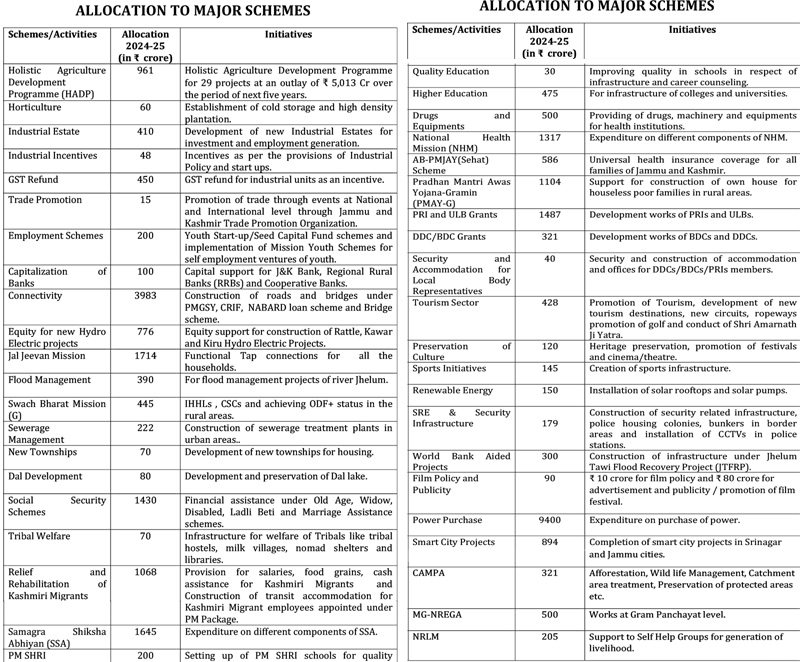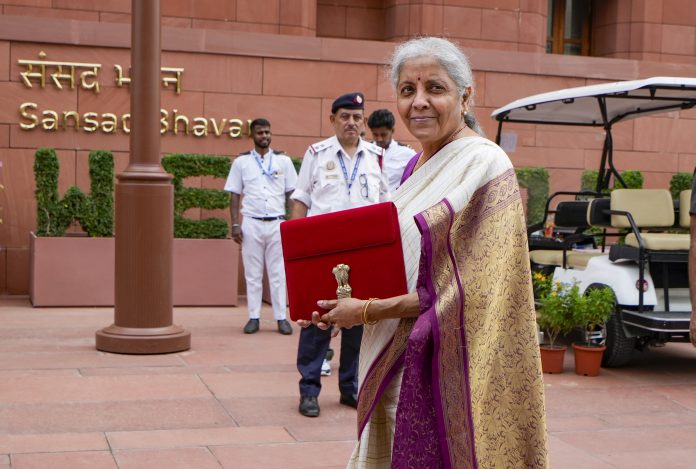FM presents Rs 1,18,390 cr budget for J&K
*Economy to grow by 7.5 pc, Fiscal deficit at Rs 7902 cr
*New Startup policy to be introduced for entrepreneurs
Sanjeev Pargal
JAMMU, July 23: The Central Government has provided a special assistance of Rs 17,000 crore to Jammu and Kashmir including Rs 12,000 crore for Jammu and Kashmir Police (JKP) as Finance Minister Nirmala Sitharaman today presented Rs 1,18,390 crore worth budget of the Union Territory for the Financial Year of 2024-25 which includes revenue expenditure of Rs 81,486 crore and capital expenditure of Rs 36,904 crore.
Follow the Daily Excelsior channel on WhatsApp
For the first time, the JKP figured in the grants of the Union Ministry of Home Affairs (MHA) which was exclusively reported by the Excelsior earlier.
The Union Government has agreed to provide for salary, pension and other costs of Jammu and Kashmir Police for which an allocation of Rs 12,000 cr has been made in the annual budget. Apart from this, a lump sum special grant of Rs 5,000 crore is being given to the UT as additional Central assistance in the current financial year.
“We observed that due to historical challenges in financial management, J&K has a legacy of very high fiscal stress. This is aggravated by the committed nature of the major expenditures not supported by proportionate increate in its revenue. Its dependence on Central grant is to the tune of around 70 percent of its total expenditure.
“This year, the Government of India decided to correct this historical aberration by providing adequate financing support to Jammu and Kashmir coupled with reforms to come out of perpetual fiscal stress. To correct the complex fiscal stress, a special Central assistance of Rs 17,000 crore has been worked out,” the Finance Minister said.
As per the budgetary documents tabled in the Parliament today by the Union Finance Minister, Rs 17,000 cr worth special package will reduce by 3 percent the fiscal deficit to GDP ratio of Jammu and Kashmir in 2024-25. The special package will be part of overall Central assistance which is estimated at Rs 67,133 crore.
“It is observed that around 11 percent budget of J&K is used for police. Such expenses on policing being unavoidable leave limited space for spending on development and welfare projects. The Union Government has agreed to take entire burden of police budget from UT of J&K. The Centre will now provide funds for salary, pension and other costs of JKP for which an allocation of Rs 12,000 crore has been made in the annual budget,” the Finance Minister said.

Out of a total of Rs 1,18,390 crore worth budget, the revenue expenditure includes Rs 81,486 crore and capital expenditure will be to the tune of Rs 36,904 crore. The revenue receipts will be Rs 98.719 crore and capital receipts will be Rs 19,671 crore. There is Rs 7902 crore worth fiscal deficit while capital expenditure’s contribution towards GSDP will be 14.01 percent. Expected GSDP is Rs 2,63,399 crore and expected growth in GSDP is pegged at 7.5 percent.
Focus areas of the budget include building physical and social infrastructure, strengthening governance & grassroots democracym promoting sustainable agriculture & industrial growth, nurturing employment generation & responsible toursim, women empowerment and social inclusion.
Sitharaman referred to strong growth in revenue collection in 2023-24 which made J&K as one of the fastest growing Union Territory. The economy remains on right track with GDP growth for financial year (2023-24) expected to be 7.5 percent. Revenue collections under GST recorded 12 percent growth while excise collection went up by 39 percent. Motor Spirit taxes and stamp and registration revenue were also up significantly.
Announcing completion of Baramulla-Reasi section of railway line, the Finance Minister said work on remaining section from Katra to Reasi (17 kilometers) is expected to be completed in 2024-25.
 “Work on Jammu-Udhampur-Srinagar-Baramulla railway is in the final stages of commissioning. The Railway lines between Banihal-Khari-Sumber-Sangaldan section (48 kilometers) and Reasi-Sangaldan section (46 kilometers) and electrification of Baramulla-Srinagar-Banihal-Sangaldan section (186 kilometers) have been completed during 2023-24. With this, 255 kilometers out of 272 kilometers railway line, which is crucial from socio-economic and strategic dimensions will get commissioned,” she said.
“Work on Jammu-Udhampur-Srinagar-Baramulla railway is in the final stages of commissioning. The Railway lines between Banihal-Khari-Sumber-Sangaldan section (48 kilometers) and Reasi-Sangaldan section (46 kilometers) and electrification of Baramulla-Srinagar-Banihal-Sangaldan section (186 kilometers) have been completed during 2023-24. With this, 255 kilometers out of 272 kilometers railway line, which is crucial from socio-economic and strategic dimensions will get commissioned,” she said.
Asserting that the Government is committed to empower local Government institutions and strengthen grassroots governance, Sitharaman said the J&K Government is making preparations to conduct local body elections, including those towards the Constitutional obligations for providing reservations.
She announced introduction of 200 more e-buses under PM e-bus Sewa in the UT in near future.
She also announced completion of construction of 1500 flats as transit accommodation for Kashmiri migrant employees and filling up of remaining 276 posts out of 6000 under PM Package during 2024-25.
In her speech tabled on floor of the Parliament, Sitharaman said J&K has witnessed unprecedented socio-economic development since historic reforms initiated in August 2019, a reference towards abrogation of special status of erstwhile State.
Triggered by these reforms, she said, the UT Government has pursued the path of accelerated and inclusive growth to fulfill aspirations of the common man. This has ensured remarkable progress encompassing entire governance including development activities, public administration and security matters which has positively impacted every resident irrespective of caste, creed or religion.
“Since 2019, entire region has witnessed an era of peace, progress and prosperity. Life has returned to normalcy in J&K after over three decades of turmoil. Schools, colleges, universities, hospitals and other public institutions are functioning efficiently without any strikes or any kind of disturbances during last four years. Previous practice of daily hartals, strikes, stone pelting and bandhs are things of the past now,” she said, adding this has also enabled the people to discover their untapped potential, address aspirations of young generation and contribute whole-heartedly in the development journey.
She said she was confident that Jammu and Kashmir is on a right trajectory and would emerge as one of the much developed region and contribute immensely to Prime Minister Narendra Modi’s vision of `Viksit Bharat’.
The J&K Government, she said, remains committed to dismantle terror sponsoring ecosystem.
“Policy of zero tolerance has been adopted against terrorism and security forces have foiled the repeated efforts of those sponsoring proxy wars. The efforts and sacrifice of security forces have only boosted the confidence and resolve of our society to remain united, courageous and disciplined to fight against those who are promoting terrorism,” the Finance Minister said.
On industrial development, she said, apart from existing 64 industrial estates, 46 estates are being developed to fulfill the goal of `Made in Jammu and Kashmir’. Besides, New Start-up Policy will be introduced for creating entrepreneurship ecosystem, the Private Industrial Estate Development Policy will be revamped and 324 units are expected to come into production this year having employment potential of 18,000 persons.
On tourism front, Sitharaman said the 1942 homestays with the bed capacity of 14,180 have been registered so far in J&K. The UT is emerging again as a major attraction for film producers from around the world, establishing Jammu and Kashmir as a prime film-making destination and 102 films/web series have been shot in the year 2023.
New initiatives have been taken for development of infrastructure and basic amenities in 12 off-beat tourist destinations, six each in Jammu and Kashmir divisions, with objective of enhancing tourism appeal and expanding local business and job opportunities. Keran is being developed as tourist village and Tosamaidan and Sitharan as tourist circuits while Duggar Dani village in Samba in being developed with traditional set up in the form of `mock village’. A 130 meter high national flag mast will be installed at Patnitop.
On health front, the budget said two Cancer Institutes will be made fully operational in Jammu and Srinagar during 2024-25 while DNB seats will be enhanced to 400. AIIMS Awantipora will be made functional by March 2025 while new Nursing College will be set up at Handwara.
On power front, the budget documents said Shahpur Kandi dam project is likely to be commissioned during current financial year. The UT Government aims to expand its installed hydro power capacity from 3500 MW to about 6500 MW till 2026-27. For this, it has partnered with NHPC to develop 624 MW Kiru, 850 MW Ratle, 1000 MW Pakal Dul and 540 MW Kwar project. The Central Government provided Rs 2430.60 crore for equity contribution of the UT for these projects.
The Government is also pursuing development of further four hydro power projects of 3284 MW capacity including Sawalkote (1856 MW), Dul Hasti Stage-II (258 MW), Uri-1 stage-II (240MW) and Kirthai-II (930 MW) with expected investment of Rs 50,000 crore, the budget document said.
It said the residential colonies are being developed at Birpur in Samba, Padgampura at Pulwama, Chatterhama in Ganderbal, Bhalwal, Roop Nagar and Chowadhi Jammu for EWS beneficiaries. Besides, Integrated Mass Housing Colony is coming up at Watapora in Bandipora and Satellite Township at Rakh-Gund Aksha.
An official handout issued by the J&K government said a detailed analysis of the fiscal situation of Jammu and Kashmir was carried out by the Finance Department to address the legacy challenges which include high staff strength, low revenue base, and high debt load. The high fiscal stress caused by the committed nature of the major expenditures has increased the UT’s dependence on central grants. To address these challenges, the UT government has increased tax and non-tax revenues through improved GST return compliance, improved billing and collection efficiency, increased dealer registration, and transparent excise auctions.
“All administrative departments also intensified efforts to harness central funds by enhancing execution speed. This led to a sharp increase in receipts of funds under Centrally Sponsored Schemes. During the last financial year, the UT Government also stringently enforced borrowing limits and curtailed the culture of overdraft. With close monitoring of public debt, the UT Government was successful in tapering down the off-Budget borrowings. The Government has restrained revenue expenditure through austerity measures and biometric verification of beneficiaries. The UT Government also pursued Government of India for increasing central financial assistance,” the hand out said.
Lieutenant Governor Manoj Sinha, Chief Secretary, Atal Dulloo and Principal Secretary Finance, Santosh Vaidya led the UT’s efforts in this direction. Crucial meetings were held in June and July 2024 in Ministry of Home Affairs and Ministry of Finance to review these demands of the UT Government. Union Home Minister and Union Finance Minister personally reviewed the fiscal management of the UT Government in recent months.


